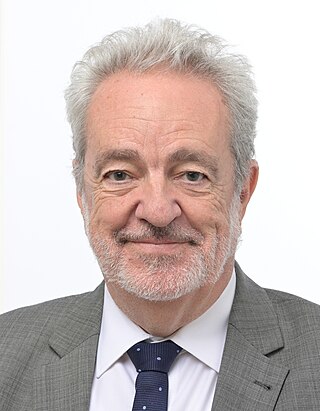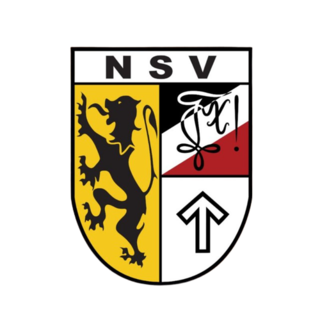Related Research Articles

Vlaams Blok was the name of a Belgian far-right and secessionist political party with an anti-immigration platform. Its ideologies embraced Flemish nationalism, calling for the independence of Flanders.

The New Flemish Alliance is a Flemish nationalist, conservative and Eurosceptic political party in Belgium. The party was established in 2001 by the right-leaning faction of the centrist-nationalist People's Union (VU).

Flanders is both a cultural community and an economic region within the Belgian state, and has significant autonomy.

Philip Michel Frans "Filip" Dewinter is a Belgian politician, journalist and commentator. He is one of the leading members of Vlaams Belang, a right-wing Flemish nationalist and secessionist political party.
Vlaams Belang is a Flemish nationalist, Eurosceptic and right-wing populist political party in the Flemish Region and Brussels Capital Region of Belgium. It is widely considered by the media and political analysts to be on the political far-right, although it self-describes as right-nationalist and has tried to distance itself from the far-right label in recent years.
The Belgian Negationism law, passed on 23 March 1995, bans public denial of nazi genocide war crimes like the Holocaust. Specifically, this law against negationism makes it illegal to publicly "deny, play down, justify or approve of the genocide committed by the German National Socialist regime during the Second World War". Prosecution is led by the Belgian Centre for Equal Opportunities. The offense is punishable by imprisonment of up to one year and fines of up to 2,500 EUR.

Gerolf Emma Jozef Annemans is a Belgian lawyer, journalist and politician of the Flemish nationalist party Vlaams Belang (VB) and formerly of its predecessor, the Vlaams Blok. He has been a member of the European Parliament since 2014, and a city councilor in Antwerp since 2000. He served as a member of the Chamber of Representatives from 1987 to 2014, and as a city councilor in Brasschaat from 1994 to 2000. He was the former leader of the VB from 2012 to 2014, and led the Vlaams Blok and VB parliamentary groups from 1991 to 2013.
Blokwatch is the name of a Belgian newssite, a virtual archive and documentation centre, and meeting point for research on and about the far right in Flanders. Most of its attention is attributed to the Vlaams Belang. Among other things, the site provides the complete version of the Vlaams Belang party statutes ("Basisbeginselen") and the notorious "70 steps plan".

The Dutch-speaking electoral college is one of three constituencies of the European Parliament in Belgium. It currently elects 13 MEPs using the D'Hondt method of party-list proportional representation. Before it elected 14 MEPs, until the 2007 accession of Bulgaria and Romania.

The Nationalistische Studentenvereniging (NSV) (Dutch; "Nationalist Student Association") is a far-right Flemish nationalist student political group in Belgium, with chapters in Antwerp, Brussels, Ghent, Leuven, West Flanders (including Bruges, Roeselare, Ostend and Kortrijk), Hasselt and Mechelen.

Hans Van Themsche is a Belgian student who, on 11 May, 2006, shot three people, killing two and severely injuring another, before being shot by police and incapacitated. He was sentenced to life in prison in 2008.

Filip Emiel Julien De Man is a Flemish politician and journalist. He has an M.A. in philosophy and lives in Vilvoorde, Flemish Brabant. He is the brother of actress Brigitte De Man and the son of Jos De Man, a well-known lawyer and writer.
Karim Van Overmeire is a Flemish politician, author, city planner and member of the New Flemish Alliance party.
Hugo Schiltz was a Belgian lawyer and politician. He was Belgian MP from 1965 to 1988 and senator from 1992 to 1995. He was also twice minister, from 1981 to 1985 in the first Flemish Government and between 1988 and 1991 in the Belgian federal government Martens VIII. He was further president of the Flemish political party Volksunie between 1975 and 1979.

The 0110 concerts, held on October 1, 2006, in Antwerp, Brussels, Charleroi and Ghent, were organised by dEUS frontman Tom Barman, Arno Hintjens and Frederik Sioen to promote tolerance in Belgian society, and "against Vlaams Belang, extremism and gratuitous violence".

The Belgian Anti-Racism Law, in full, the Law of 30 July 1981 on the punishment of certain acts inspired by racism or xenophobia, is a law against hate speech and discrimination passed by the Federal Parliament of Belgium in 1981 which made certain acts motivated by racism or xenophobia illegal. It is also known as the Moureaux Law, as it was proposed to the Parliament by Justice Minister Philippe Moureaux.
Jef Elbers is a Flemish singer, script writer, and political activist.

Tom Vandendriessche is a Belgian politician and businessman currently serving as a Member of the European Parliament for the Vlaams Belang.
Events from the year 1992 in Belgium.
Sam van Rooy is a Belgian politician for Vlaams Belang, author, blogger and former professional cyclist.
References
- 1 2 3 4 Coffé, Hilde (2005). The adaptation of the extreme right's discourse: the case of the Vlaams Blok. pp. 209–210.
- ↑ National Analytical Study on Racist Violence and Crime Archived 2006-10-12 at the Wayback Machine , RAXEN Focal Point for Belgium, Centre for Equal Opportunities and Opposition to Racism, page 11.
- ↑ "70 puntenplan van het Vlaams Blok: wat werd uitgevoerd en wat niet?". Knack magazine (in Dutch). March 23, 2016.
- ↑ "70-puntenplan Vlaams Blok geen taboe meer: de opvallendste voorbeelden". Het Laatste Nieuws (in Dutch). March 13, 2015.